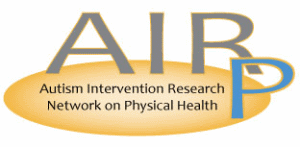Autism Intervention Research Network on Physical Health (AIR-P) Activities
April 15, 2014
 The Autism Intervention Research Network on Physical Health (AIR-P) conducts research on evidence-based interventions to improve the physical health and well-being of children and adolescents with autism spectrum disorders (ASD) and other developmental disabilities. The network also works to disseminate main findings to parent and professional communities. Activities include developing and/or updating evidence-based guidelines and validating tools for interventions; disseminating critical information on network research findings, guidelines developed, and validated tools to health professionals and the public; and developing and mentoring new investigators in the field of ASD and other developmental disabilities. The AIR-P has been highly productive in all of these areas. In 2013, the AIR-P Network published 15 manuscripts in peer-reviewed journals, adding to the 32 manuscripts previously published since the inception of the Network. Three papers have already been accepted for publication in 2014, with seven more submitted and under review. Many manuscripts are also in process using data from two signature AIR-P research projects, various other AIR-P research projects, as well as from secondary data analysis of the patient registry, built as part of the Autism Speaks Autism Treatment Network (AS ATN). The main topics of our papers include co-morbidities for children with ASD, and more specifically, nutrition and obesity, sleep problems, gastrointestinal concerns, anxiety as well as quality of life.
The Autism Intervention Research Network on Physical Health (AIR-P) conducts research on evidence-based interventions to improve the physical health and well-being of children and adolescents with autism spectrum disorders (ASD) and other developmental disabilities. The network also works to disseminate main findings to parent and professional communities. Activities include developing and/or updating evidence-based guidelines and validating tools for interventions; disseminating critical information on network research findings, guidelines developed, and validated tools to health professionals and the public; and developing and mentoring new investigators in the field of ASD and other developmental disabilities. The AIR-P has been highly productive in all of these areas. In 2013, the AIR-P Network published 15 manuscripts in peer-reviewed journals, adding to the 32 manuscripts previously published since the inception of the Network. Three papers have already been accepted for publication in 2014, with seven more submitted and under review. Many manuscripts are also in process using data from two signature AIR-P research projects, various other AIR-P research projects, as well as from secondary data analysis of the patient registry, built as part of the Autism Speaks Autism Treatment Network (AS ATN). The main topics of our papers include co-morbidities for children with ASD, and more specifically, nutrition and obesity, sleep problems, gastrointestinal concerns, anxiety as well as quality of life.
The AS ATN/AIR-P Network has also developed evidence-based guidelines and validated tools for interventions as well as mentoring new investigators in the field. One area in need of better instruments is a good measure of function in individuals with autism, as current functional measures tend to focus on conditions with physical disabilities. Demonstration of treatment effects has been limited by a lack of psychometrically sound measurement tools that are sensitive to change in core symptoms of ASD. Under AIR-P RFA-11-03 a pilot study of the Autism Impact Measure (AIM) was conducted by Drs. Micah Mazurek, a young investigator, and Steve Kanne of the Thompson Center at the University of Missouri. The AIM uses a novel approach designed to be sensitive to incremental changes in ASD symptoms. Results of their project were published in Journal of Autism and Developmental Disorders, titled "The Autism Impact Measure (AIM): Initial Development of a New Tool for Treatment Outcome Measurement" (2014 Jan; 44(1):168-79. doi: 10.1007/s10803-013-1862-3). Dr. Mazurek, an assistant professor at University of Missouri, has received an NIH grant that will further examine construct validity and examine the measure's sensitivity to change following treatment. A major goal across federal health agencies is to improve the lives of children with ASD by developing interventions that target core symptoms of the disorder, and the development of a reliable and valid treatment-outcome measure has the potential to enhance the pace of treatment-outcome research.
Another goal of the AIR-P Network is to provide opportunities to develop collaborations and partnerships with clinicians and researchers who are external to the current AIR-P centers. The Network provides a variety of mechanisms to encourage involvement in AIR-P activities and has demonstrated particular interest in supporting junior investigators in developing their research efforts to improve the medical care of children with autism. One of these mechanisms provides support to investigators interested in mining existing Network Registry data. We have developed a Request for Analysis (RFA), which allows an individual to submit a formal request to obtain summary data from the AS ATN Registry which is conducted in collaboration with AIR-P. The online RFA submission is electronically routed to the MGH Clinical Coordinating Center (CCC) for review and approval. Upon approval, the MGH Data Coordinating Center (DCC) - the MGH Biostatistics Center - supports necessary follow-up and analysis. Past analyses by external investigators has led to dissertations and manuscripts by trainees in pediatrics and psychology as well as other junior faculty members at various institutions.
For more information, and a full listing of our published manuscripts, please visit our public website: www.autisminterventionresearch.net.







